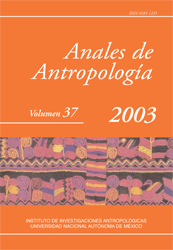La feminización de la vida rural en el contexto de la migración masculina a los Estados Unidos en el estado de Puebla. Una perspectiva comparativa
Main Article Content
Abstract
This essay questions theoretical debates concernig the situation of rural mexican women married or attached to migrants in the United States, that either consider them empowered or inexorably subordinated. The authors suggest that the situation of women is redefined in their life course and in the domestic cycle. These transitions are analyzed taking into account the dimensions of time and space in the experience of “long-distance-conjugality” in three communities located in the Mexican state of Puebla, where migration has reached extraordinary levels over the past two decades. Until now, those flows have mostly involved men. The effect of male migration on women’s life is ambiguous. On one hand, they are now present in space that have been until recently monopolized by men; while on the other, lines between chores and occupations, spaces and times regulated by gender system tend to fade. These changes in the distribution of time and space led to the feminization of rural life, at great cost to social relations.
Downloads
Article Details
How to Cite
DAubeterre Buznego, M. E., Marroni, M. da G., & Rivermar Pérez, M. L. (2010). La feminización de la vida rural en el contexto de la migración masculina a los Estados Unidos en el estado de Puebla. Una perspectiva comparativa. Anales De Antropología, 37(1). https://doi.org/10.22201/iia.24486221e.2003.1.16746
Citas en Dimensions Service
Esta revista usa una licencia CC del tipo CC BY-NC-ND 3.0. Se maneja bajo el esquema de acceso abierto, con una licencia Creative Commons Attribution-NonCommercial-NoDerivs 3.0 Unported.
